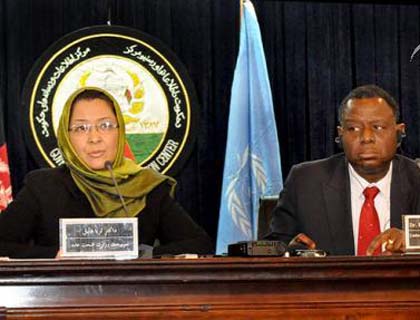KABUL - With the world population set to reach seven billion people, the United Nations on Monday called for focus on Afghan girls' health and education, calling the spending the smartest investments a country can make.
In a report, the United Nations Population Fund (UNPFA) said people less than 25 years old mad up almost 70 percent of Afghanistan's total population. With health, education and opportunities, girls and women could contribute fully to their societies and help break the cycle of poverty.
Population dynamics in Afghanistan are described by the population growth (3.1pc), urban population (23pc), total fertility rate (6pc), life expectancy at birth for male and female (49pc) and population using an improved sanitation facility (37pc).
According to the report, maternal mortality in the country is 1400 per 100,000 live births, births attended by skilled health personnel 14pc, contraceptive prevalence rate 23pc and modern method 15pc.
Calling the population's projection at 7 billion, the UN said the global milestone was both an opportunity and a challenge. "With planning and the right investment in people now, our world of 7 billion can have thriving sustainable cities, productive labor forces that fuel economies and youth populations that contribute to the well-being of their societies," said UNFPA Executive Director Dr. Babatunde Osotimehin.
The State of World Population report is mainly a report from the field, where demographers, policymakers, governments, civil society and individuals are grappling with population trends ranging from ageing to rapidly rising numbers of young people, from high population growth rates to shrinking populations, and from high rates of urbanization to rising international migration.
China, Egypt, Ethiopia, Finland, India, Mexico, Mozambique, Nigeria and the former Yugoslav Republic of Macedonia are the countries featured in this report, which called for educating and empowering girls and women to have fewer children than their mothers and grandmothers did.
Of the world's 7 billion people, 1.8 billion are young people between the ages of 10 and 24. "As parents and teachers of the next generation, their choices will determine future population trends. Investing in the health and education of youth would yield enormous returns in economic growth and development for generations to come.

